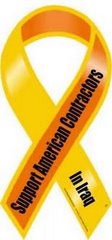Mother works to memorialize contractor son slain in Iraq
THOMAS J. SHEERAN
Associated Press
BRATENAHL, Ohio - While the nation pauses on Memorial Day to honor its war dead, Donna Zovko works to keep alive the memory of her son, who was killed in Iraq while serving as a civilian contractor.
She wants him and other contractors to be remembered along with the fallen members of the nation's military.
"On my Jerry's headstone there's no `contractor'," said Donna Zovko, whose son, Jerko "Jerry" Zovko, 32, was killed in a March 31, 2004, ambush with three civilian colleagues in Fallujah. Their mutilated bodies were burned and two were hung from a bridge.
Jerry Zovko, an Army veteran, was working for Pentagon contractor Blackwater USA hauling food to American troops. His mother likes to think of him as a comrade in arms to U.S. troops even though he was working for a civilian contractor.
"How will Americans treat or remember my son as a contractor that was killed?" she asked. "It's their choice, but he was there to protect our freedom and to help the Iraqis. He was not there for the money."
Zovko has waged a high-profile campaign for tighter oversight of military contractors, appearing in a documentary film, "Iraq for Sale: the War Profiteers," and testifying before a congressional committee Feb. 7.
More than 3,400 members of the U.S. military have died since the start of the Iraq war in March 2003. More than 900 civilian employees of U.S. government contractors have been killed.
Donna Zovko sobbed occasionally during a recent interview on her high-rise balcony overlooking Lake Erie near Cleveland and said she rejects the suggestion that contractors in Iraq are only motivated by big paychecks.
"I prefer to think of him the way he told me," Zovko said. "That he was needed there and the skills that he learned in the military were needed and he went."
While the military takes care of its own, Zovko said, "In private contracting no one is responsible. They put it under the carpet and go on. It's not talked about. It's not answered to."
She understands the honors accorded military victims but hopes people remember the contributions made by those hired by the Pentagon to free soldiers and Marines for combat duty.
Zovko especially feels for civilian contractors without a military background like her son, who was buried with military honors at the Ohio Western Reserve National Center near Akron.
"My heart breaks for them because if it was 9/11 that moved those young men to go and become contractors and to go there with such a pure heart and a good will and lose their lives, their families cannot count on those companies that contracted their son," she said.
She blames contractors for thinking more about profits than the safety of their employees.
Blackwater has argued that it abided by its contractual obligations.
"The four men lost in Fallujah weigh heavily on the hearts of everyone at Blackwater and our sympathies remain with the families," the company told The Associated Press in an e-mail on Friday.
Blackwater does not release the names of those killed and memorializes its dead in private. At its headquarters in Moyock, N.C., the company engraves a stone in its memorial rock garden for each contractor killed while serving.
Nancy Taylor, who teaches future school counselors at John Carroll University in nearby University Heights, said Zovko's advocacy on military contractor oversight could bring attention to the issue of contractor deaths.
"As an American public, if we're not tuned into them, we need to be aware about them. That's something that Donna Zovko seems to be doing, making people aware of her son so that people can appreciate their efforts and support what they stood for," Taylor said.
"Anybody who has, in essence, been martyred certainly deserves the same respect as any other person, whether they had a uniform on or not."
Zovko's suggestion for remembering her son and the three killed with him, Scott Helvenston, Wesley Batalona, and Michael Teague, was to put their name on proposed legislation to increase oversight of military contractors.
She said it isn't hard emotionally visiting her son's grave, but is difficult leaving the cemetery.
"I know the way the casket was laid in the ground, if my Jerry's body was whole where his body would be and I can touch the ground where his heart would be. I pray and pray. You can never say enough prayers."
Associated Press writer Mike Baker in Raleigh, N.C., contributed to this report.
Subscribe to:
Post Comments (Atom)

No comments:
Post a Comment